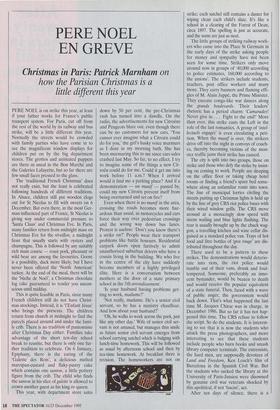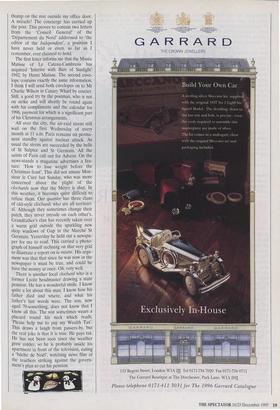PERE NOEL EN GREVE
Christmas in Paris: Patrick Marnham on
how the Parisian Christmas is a little different this year
PERE NOEL is on strike this year, at least if your father works for France's public transport system. For Paris, cut off from the rest of the world by its railway and bus strike, will be a little different this year, Normally the streets would be crowded with family parties who have come in to see the magnificent window displays for children put on by the big department stores. The grottos and animated puppets are there as usual in the Bon Marche and the Galeries Lafayette, but so far there are few small faces pressed to the glass,
The 'traditional French Christmas' does not really exist, but the feast is celebrated following hundreds of different traditions. In Alsace, children still put wooden clogs out for St Nicolas to fill with sweets on 6 December. But even there, in the most Ger- man-influenced part of France, St Nicolas is giving way under commercial pressure to `Santa Claus' and Christmas Eve. In Paris, many families return from midnight mass on Christmas Eve for the reveillon, a midnight feast that usually starts with oysters and champagne. This is followed by any suitably rich main course — roast pork, pheasant or wild boar are among the favourites. Goose is a possibility, duck more likely, but I have never been offered the 'North American' turkey. At the end of the meal, there will be the 'Niche de Noel', a Christmas chocolate log cake guaranteed to render you uncon- scious until midday.
This is quite feasible in Paris, since many French children still do not have Christ- mas stockings. Instead, it is TEnfant Jesus' who brings the presents. The children return from church at midnight to find the parcels placed around and under the fami- ly crib. There is no tradition of pantomime after Christmas Day either. Families take advantage of the short ten-day school break to reunite, but there is only one fur- ther tradition to celebrate. On 6 January, Epiphany, there is the eating of the `Galette des Rois', a delicious melted marzipan-custard and flaky-pastry cake which contains one santon, a little pottery figure from the crib. The child who finds the santon in his slice of galette is allowed to crown another guest as his king or queen.
This year, with department store sales
down by 50 per cent, the pre-Christmas rush has turned into a dawdle. On the radio, the advertisements for new Citroens and Peugeots blare out, even though there can be no customers for new cars. `You cannot ever imagine what a Citroen could do for you,' the girl's husky voice murmurs as I doze in my morning bath. She has been murmuring this to me since cars sales crashed last May. So far, to no effect. I try to imagine some of the things a new Cit- roen could do for me. Could it get me into work before 11 a.m.? When I arrived would it find me a parking place? And if a demonstration — un manif — passed by, could my new Citroen prevent itself from being overturned and set on fire?
Even when there is no manif in the area, crossing the roads becomes more haz- ardous than usual, as motorcycles and cars force their way over pedestrian crossings and the wrong way down bus lanes. Protest is useless: 'Don't you know there's a strike on?' People wear their transport problems like battle honours. Residential carpark doors open furtively to admit unauthorised suburban drivers who have a cousin living in the building. We who live in the centre of the city have suddenly become members of a highly privileged elite. Here is a conversation between mothers at the door of a state primary school in the 5th arrondissement.
`Is your husband having problems get- ting to work, madame?'
`Not really, madame. He's a senior civil servant, so he has a ministry chauffeur. And how about your husband?'
`Oh, he walks to work across the park, just like any other day.' Wife of senior civil ser- vant is not amused, but manages thin smile as future senior civil servant emerges from school carrying satchel which is bulging with lunch-time homework. This will be followed as usual by afternoon school and then by tea-time homework. At breakfast there is revision. The homeworkers are not on strike; each satchel still contains a duster for wiping clean each child's slate. It's like a school in a clearing of the Forest of Dean, circa 1897. The spelling is just as accurate, and the sums are just as neat.
The little groups of striking railway work- ers who came into the Place St Germain in the early days of the strike asking people for money and sympathy have not been seen for some time. Strikers only move around now in groups of '40,000 according to police estimates, 160,000 according to the unions'. The strikers include students, teachers, post office workers and many more. They carry banners and flaming effi- gies of M. Alain Juppe, the Prime Minister. They execute conga-like war dances along the Brands boulevards. Their leaders' rhetoric has a period charm: `Camarades! Never give in . . . Fight to the end!' More than ever, this strike casts the Left in the role of the last romantics. A group of 'intel- lectuels engages' is even circulating a peti- tion. When the manif is over, the strikers drive off into the night in convoys of coach- es, thereby becoming victims of the mon- ster traffic jams their strike has caused.
The city is split into two groups, those on strike and those who defy the strike by insist- ing on coming to work. People are sleeping on the office floor or taking cheap hotel rooms or finding a friend's spare bed some- where along an unfamiliar route into town. The line of municipal lorries circling the streets putting up Christmas lights is held up by the line of grey CRS riot police buses with their wired window grills. The CRS move around at a menacingly slow speed with sirens wailing and blue lights flashing. The rear is usually brought up by the chuck wag- gon, a travelling kitchen and wine cellar dis- guised as a standard police van. Trays of hot food and litre bottles of Bros rouge' are dis- tributed throughout the day.
There used to be a pattern to these strikes. The demonstrations would deterio- rate into riots, the riot police would tumble out of their vans, drunk and foul- tempered. Someone, preferably an inno- cent bystander, would be beaten to death and would receive the popular equivalent of a state funeral. Then, faced with a wave of public anger, the government would back down. That's what happened the last time M. Jacques Chirac was in charge, in December 1986. But so far it has not hap- pened this time. The CRS refuse to follow the script. So do the students. It is interest- ing to see that it is now the students who attack the press photographers, and more interesting to see that these students include people who burn books and smash library computer terminals. The extremists, the hard men, are supposedly devotees of Land and Freedom, Ken Loach's film of Barcelona in the Spanish Civil War. But the students who sacked the library at the University of Paris-Jussieu were disowned by genuine civil war veterans shocked by this apolitical, if not 'fascist', act.
After ten days of silence, there is a
thump on the mat outside my office door. A miracle! The concierge has carried up the post. This proves to contain two letters from the 'Conseil General' of the `Departement du Nord' addressed to 'the editor of the Independent', a position I have never held or even, as far as I remember, ever claimed to hold.
The first letter informs me that the Musee Matisse of Le Cateau-Cambresis has acquired 'Interior with Bars of Sunlight' 1942, by Henri Matisse. The second enve- lope contains exactly the same information. I think I will send both envelopes on to Mr Charlie Wilson in Canary Wharf by courier. Still, a good try by the postman, who is not on strike and will shortly be round again with his compliments and the calendar for 1996, payment for which is a significant part of his Christmas arrangements.
All over the city, the air-raid sirens still wail on the first Wednesday of every month at 11 a.m. Paris remains on perma- nent standby against nuclear attack. As usual the sirens are succeeded by the bells of St Sulpice and St Germain. All the saints of Paris call out for Advent. On the news-stands a magazine advertises a fea- ture: 'How to lose weight before the Christmas feast'. This did not amuse Mon- sieur le Cure last Sunday, who was more concerned about the plight of the clochards now that the Metro is shut. In this weather, it becomes quite difficult to refuse them. Our quartier has three clans of old-style clochards who are all territori- al. Although they sometimes change their patch, they never intrude on each other's. Grandfather's clan has recently taken over a warm grid outside the sparkling new shop windows of Gap in the Marche St Germain. Yesterday he held out a newspa- per for me to read. This carried a photo- graph of himself reclining on that very grid to illustrate a report on la misere. His in was that that since he was now n the
newspaper it must be true, and could he have the money at once. Oh, very well.
There is another local clochard who is a former Lycee headmaster drawing a state pension. He has a wonderful smile. I know quite a lot about this man. I know how his father died and where, and what his father's last words were. The son, now aged 70-something, does not know that I know all this. The son sometimes wears a placard round his neck which reads, `Please help me to pay my Wealth Tax'. This draws a laugh from passers-by, but the real joke is that it is true. He pays tax. He has not been seen since the weather grew colder, so he is probably inside his apartment in front of the television, eating a %fiche de Noel', watching news film of the teachers striking against the govern- ment's plan to cut his pension.











































































































 Previous page
Previous page